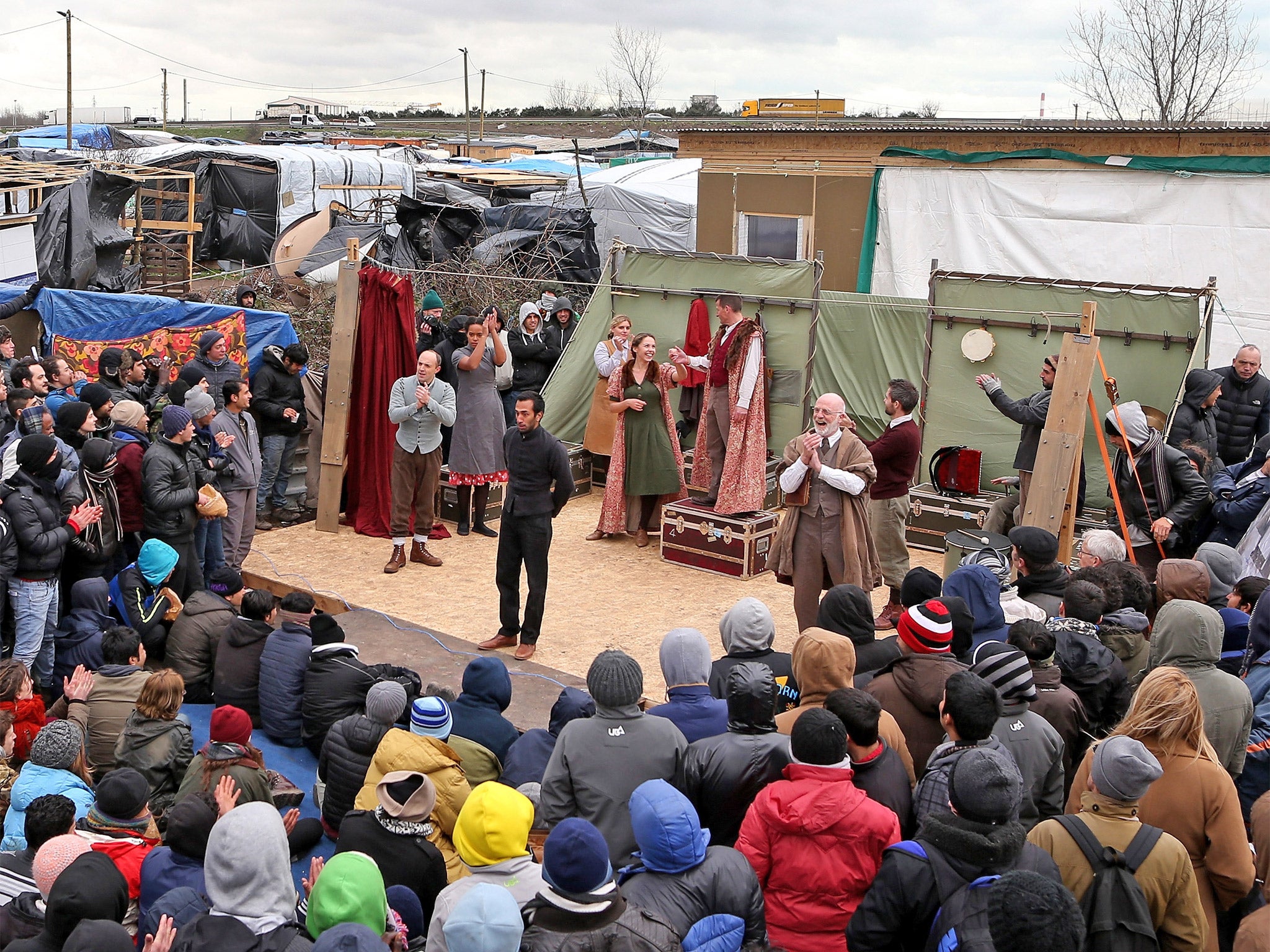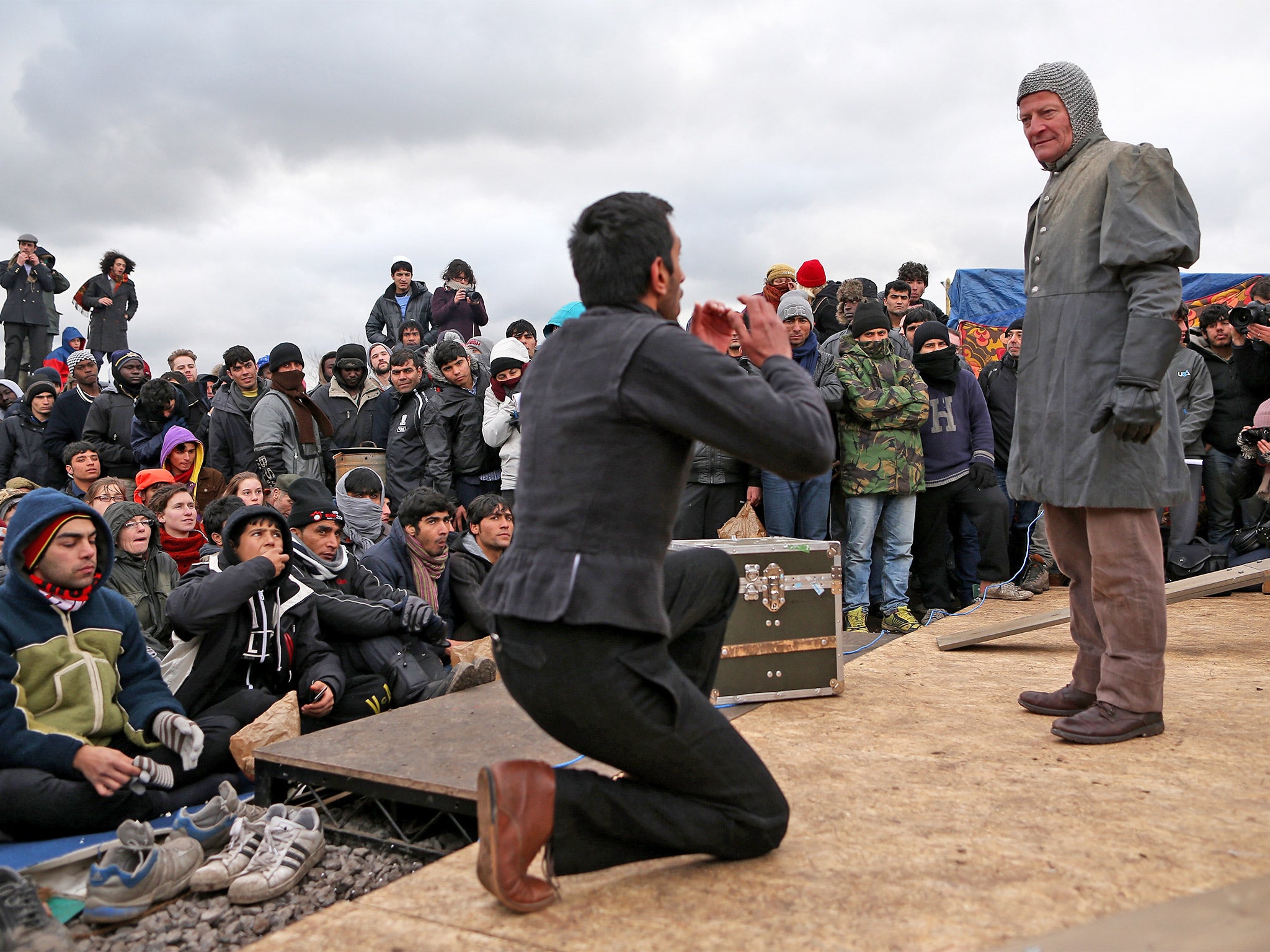Shakespeare’s Globe performs Hamlet at Calais Jungle refugee camp
The Globe’s production is the latest instalment in a two-year tour aiming to visit every country in the world

With a scarf wrapped around his head, Abdu Karim taps his feet to keep warm as he waits for the Globe production of Hamlet to begin. He stands on muddy ground in the middle of the infamous Jungle refugee camp in Calais. A computer software engineer in his former life in Sudan, he has read Shakespeare, Dickens and Victor Hugo in Arabic translation.
“This is a good place,” says the 27-year-old, gesturing towards the Good Chance theatre where the production is to be held. “I come for fun. Sometimes it helps to forget about what goes on here.”
Mentioning tear gas, he trails off. Over the weekend, the French authorities reportedly shot the eye-watering substance into the camp. On Monday, bulldozers flattened a large swathe of land.
Hamlet’s “to be, or not to be” soliloquy holds a particular poignance when performed to people whose lives are in such limbo.
Around 300 people from different war-torn countries braved icy wind and rain to accompany Karim in watching the production. It is the latest instalment in a two-year tour from Shakespeare’s Globe that was launched in 2014 with the aim to visit every country in the world.
When five nations were deemed no-go zones - Syria, the Central African Republic, Libya, Yemen and South Sudan - the London theatre decided to play to their dispossessed citizens in refugee camps instead. At first glance, the idea seems a little frivolous. Surely refugees need running water, not Shakespeare? But, as the organisers point out, basic amenities and high culture are not mutually exclusive.

They also hope the production will humanise the camp’s inhabitants and draw rare positive attention to their plight. It also, of course, provides entertainment to counteract the grinding tedium of life in the camp.
“Yeah, I’m bored,” says Abdul Aokrr, 21, ahead of the performance. “We can’t do anything, we just stay in our shelters.” Originally from Afghanistan, he has been here for eight months. His hours are built around the nightly routine of trying to break on to lorries heading to the UK.

The Globe’s production has already played to many others in similarly desperate situations. It has stopped off at the Zaatari refugee camp in Jordan, populated predominantly by Syrians, and the Mirkazi camp in Djibouti, home to many Yemenis. Hosting citizens of 22 nationalities, the Calais camp poses a unique challenge. Before the actors take to the stage, photocopied synopses of the play are handed out in Kurdish, Pashto, Arabic, English, Farsi and French.
Despite the challenges, Tom Bird, executive producer of Shakespeare’s Globe, was unfazed when he spoke in London ahead of the performance. “We’ve played to a vast range of audiences around the world,” he said. “In 2014, we played to the UN in New York. It was odd having all these representatives different nationalities sat behind their desks. But there is a parallel to playing in the jungle.”
The stage on which the performance is held is built from wooden pallets over the course of the morning. It stands in front of the Good Chance tent, which was erected by a London theatre group last October. Some critics have made hay over its existence: the tent is used for yoga and karate classes as well as acting workshops. But any insinuation that the residents of ‘the Jungle’ - who, for the main part, live in huts made of chipboard and tarpaulin - are pampered is frankly untrue.
Joe Friday, a British activist, has been based in the camp on-and-off since October when he started the ‘A Home For Winter’ project, building basic accommodation for the camp’s inhabitants. Shelter may be a more pressing need, but he believes strongly that the Good Chance theatre provides an important service.
“We all have a right to enjoy our day, not just survive it. This helps make the place feel fun and normal and it draws attention to the situation - and not through reports of something bad happening.”
“I think it’s easy for people in the camps to become depersonalised - a ‘bunch of migrants’ to quote our Prime Minister. It’s important to strip that back: this isn’t a political situation, it’s a humanitarian one.”
Just before the actors take to the stage, brown paper bags of popcorn are handed out to the crowd. A group of Afghani teenagers look perplexed: it is the first time they have tried popcorn. For the next hour and a half, despite the inhospitable weather and flinty sky above, they and those with whom they are gathered, laugh and whoop their way through a truncated but heartily-delivered performance. Many of the lines pass the refugees by. But the seriousness that clouds their daily lives is – for a short moment at least – suspended.
Join our commenting forum
Join thought-provoking conversations, follow other Independent readers and see their replies
Comments
Bookmark popover
Removed from bookmarks